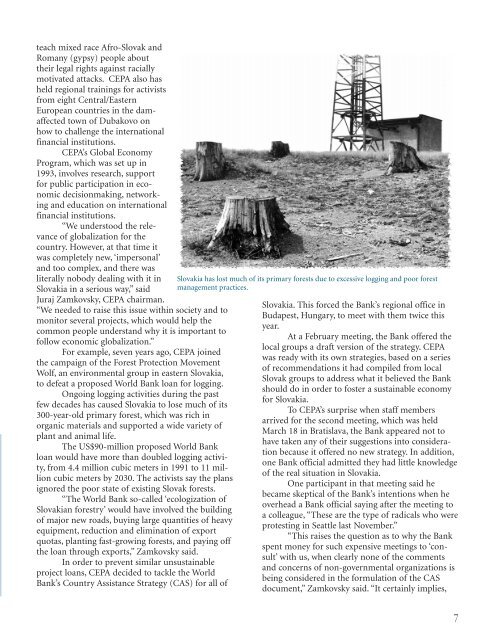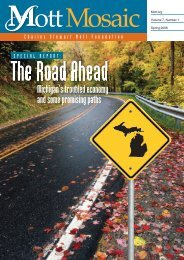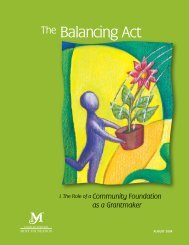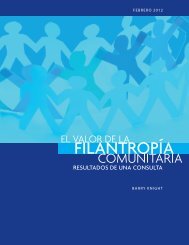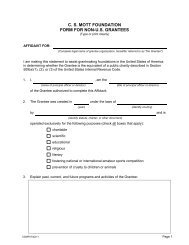mottnow August 2000 - Charles Stewart Mott Foundation
mottnow August 2000 - Charles Stewart Mott Foundation
mottnow August 2000 - Charles Stewart Mott Foundation
- No tags were found...
Create successful ePaper yourself
Turn your PDF publications into a flip-book with our unique Google optimized e-Paper software.
teach mixed race Afro-Slovak andRomany (gypsy) people abouttheir legal rights against raciallymotivated attacks. CEPA also hasheld regional trainings for activistsfrom eight Central/EasternEuropean countries in the damaffectedtown of Dubakovo onhow to challenge the internationalfinancial institutions.CEPA’s Global EconomyProgram, which was set up in1993, involves research, supportfor public participation in economicdecisionmaking, networkingand education on internationalfinancial institutions.“We understood the relevanceof globalization for thecountry. However, at that time itwas completely new, ‘impersonal’and too complex, and there wasliterally nobody dealing with it inSlovakia in a serious way,” saidJuraj Zamkovsky, CEPA chairman.“We needed to raise this issue within society and tomonitor several projects, which would help thecommon people understand why it is important tofollow economic globalization.”For example, seven years ago, CEPA joinedthe campaign of the Forest Protection MovementWolf, an environmental group in eastern Slovakia,to defeat a proposed World Bank loan for logging.Ongoing logging activities during the pastfew decades has caused Slovakia to lose much of its300-year-old primary forest, which was rich inorganic materials and supported a wide variety ofplant and animal life.The US$90-million proposed World Bankloan would have more than doubled logging activity,from 4.4 million cubic meters in 1991 to 11 millioncubic meters by 2030. The activists say the plansignored the poor state of existing Slovak forests.“The World Bank so-called ‘ecologization ofSlovakian forestry’ would have involved the buildingof major new roads, buying large quantities of heavyequipment, reduction and elimination of exportquotas, planting fast-growing forests, and paying offthe loan through exports,” Zamkovsky said.In order to prevent similar unsustainableproject loans, CEPA decided to tackle the WorldBank’s Country Assistance Strategy (CAS) for all ofSlovakia has lost much of its primary forests due to excessive logging and poor forestmanagement practices.Slovakia. This forced the Bank’s regional office inBudapest, Hungary, to meet with them twice thisyear.At a February meeting, the Bank offered thelocal groups a draft version of the strategy. CEPAwas ready with its own strategies, based on a seriesof recommendations it had compiled from localSlovak groups to address what it believed the Bankshould do in order to foster a sustainable economyfor Slovakia.To CEPA’s surprise when staff membersarrived for the second meeting, which was heldMarch 18 in Bratislava, the Bank appeared not tohave taken any of their suggestions into considerationbecause it offered no new strategy. In addition,one Bank official admitted they had little knowledgeof the real situation in Slovakia.One participant in that meeting said hebecame skeptical of the Bank’s intentions when heoverhead a Bank official saying after the meeting toa colleague, “These are the type of radicals who wereprotesting in Seattle last November.”“This raises the question as to why the Bankspent money for such expensive meetings to ‘consult’with us, when clearly none of the commentsand concerns of non-governmental organizations isbeing considered in the formulation of the CASdocument,” Zamkovsky said. “It certainly implies,7


